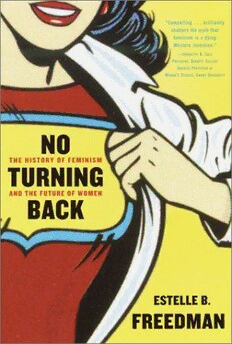
No Turning Back: The History of Feminism and the Future of Women PDF
460 Pages·2002·2.054 MB·English
Most books are stored in the elastic cloud where traffic is expensive. For this reason, we have a limit on daily download.
Preview No Turning Back: The History of Feminism and the Future of Women
Description:
Amazon.comIn the preface to her engaging narrative history of feminism, No Turning Back, Estelle Freedman thanks a woman we should all thank, someone who asked her to recommend one book that best presented feminist scholarship to date. Realizing that her only suggestions would require the woman to read extensively across a range of disciplines, Freedman set out to provide that book herself. The result is an expansive but eminently readable history of feminism, its political roots and objectives, and the case for its centrality to the future of women. While displaying an in-depth knowledge of her field in discussing women's rights, work, and the more recent history of women's political strategies, Freedman also demonstrates a willingness to engage in critical thinking beyond her own sphere and range; she explores subjects ranging from the development of labor and social roles across centuries and cultures to the ways in which race, class, and other social hierarchies inform and define different "feminisms." Acknowledging that her book does not "tell a single, unified history of revolutionary triumph," Freedman examines issues related to politics, economics, race, relationships, health, sexuality, and violence within the context of feminist history. Though it could have been a dry polemic, No Turning Back is, instead, an enthusiastic look at how and why feminist ideas have remained a part of the political landscape since their emergence. Freedman not only recognizes the complex processes of adaptation and redefinition that feminism has undergone, but proposes that this malleability is what has enabled the movement to withstand the test of time. For an obviously impassioned (but still well-reasoned and solidly supported) presentation of the story thus far, Freedman's answer to this book's instigator should now be an easy one. --S. KetchumFrom BooklistRefuting a widespread misconception that feminism is either dead or irrelevant, Freedman presents a reflective history of the divergent roots of this essential yet controversial social movement, providing a forum for understanding its genesis in an effort to quell, in her words, the fear inherent in the term itself. In her critical interpretation of the issues from racial, domestic, reproductive and sexual vantage points, among others, Freedman thoroughly and thoughtfully defines the movement's history, tracing developments over time and cultures with astonishing ecumenicism, intuitively selecting both unfamiliar and generally accepted examples, thereby making them pertinent to an increasingly diverse and discriminating audience. By purposely placing feminism's historical perspective within contemporary parameters, Freedman's interdisciplinary approach provides a scholarly precept for predicting the movement's future applications while affirming its present relevance and acknowledging its past contributions. Indeed, sustaining feminism's future in the face of rapidly evolving societal customs and political ideologies is an exciting challenge, one Freedman insists global communities are not only equal to, but for which they have demonstrated historical precedence. Carol HaggasCopyright © American Library Association. All rights reserved
See more
The list of books you might like
Most books are stored in the elastic cloud where traffic is expensive. For this reason, we have a limit on daily download.
